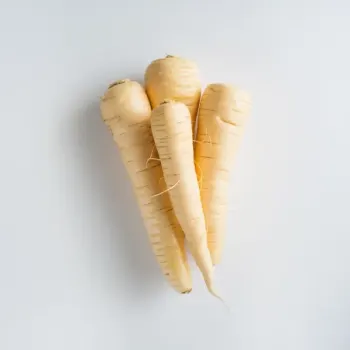Parsnips are a creamy white root vegetable with an earthy, sweet flavor, used in soups and purees. Carrots are a vibrant orange root vegetable known for their sweet, slightly earthy taste, featured in snacks, roasted dishes, and baked goods. Both are versatile in cooking.

Parsnips are a root vegetable closely related to carrots and parsley. With a creamy white appearance, these earthy, sweet-flavored roots are often used in soups, stews, and purees.

Carrots are a familiar root vegetable with a vibrant orange hue, known for their sweet and slightly earthy flavor. They are incredibly versatile, used in everything from raw snacks to roasted side dishes.
Parsnips and carrots differ in taste, texture, and color. Parsnips have a sweeter, nuttier flavor that intensifies with cooking, whereas carrots are milder with a crisper texture. In terms of color, parsnips are white to pale yellow, while carrots are most commonly found in shades of orange, although there are purple, yellow, and white varieties as well.

Your ultimate Recipe Box, Meal Planner, and Cooking Class all in one
Roasted parsnips become caramelized and tender, offering a sweet and hearty addition to any medley. They pair well with other root vegetables and are excellent in winter dishes. Carrots, when roasted, develop a concentrated sweetness and a slightly charred exterior. They add a colorful and flavorful component to a vegetable medley, perfect for balancing out more robust flavors.
Parsnip purees are rich and creamy, with a complex flavor profile that enhances soups and sides. They provide a thick and velvety texture, making them a favorite in cold-weather comfort foods. Carrot purees and soups are vibrant and silky, with a subtle sweetness and smooth consistency. They are often paired with ginger or orange to accentuate their natural flavor.
Grated parsnips can be incorporated into baked goods like muffins and cakes for moisture and a unique, sweet taste that is reminiscent of spices like nutmeg and cinnamon. Carrots are a classic addition to baked goods such as carrot cake, where they provide moisture, sweetness, and a pleasant texture, along with a nutritional boost.
Both parsnips and carrots are rich in fiber and essential vitamins, making them nutritious additions to any meal.
| Nutrient | Carrots ( per 100g ) | Parsnips ( per 100g ) |
|---|---|---|
| Fat | 0.2g | 0.3g |
| Fiber | 2.8g | 4.9g |
| Protein | 0.9g | 1.2g |
| Calories | 41 | 75 |
| Vitamin A | 835µg | |
| Carbohydrates | 10g | 18g |
Yes, you can substitute parsnips for carrots in carrot cake for a different flavor twist. Expect a cake that is slightly sweeter with a more complex flavor profile.
Both parsnips and carrots are excellent for roasting. Parsnips tend to be sweeter and softer when cooked, while carrots offer a firmer texture and a milder flavor.
Both vegetables are healthy; carrots are lower in calories and higher in vitamin A, while parsnips contain more fiber and vitamin C.
Absolutely! Mixing parsnips and carrots in a stew can provide a balance of flavors and textures, as well as adding nutritional variety.
Parsnips have a sweeter and more pronounced earthy flavor with hints of nuttiness, while carrots are milder with a sugary sweetness.